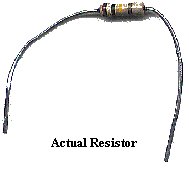
 A resistor is simply a piece of material which resists the flow of charge
through it. When you apply a voltage v across a resistor the current that
flows through it, i, is given by Ohm's law
A resistor is simply a piece of material which resists the flow of charge
through it. When you apply a voltage v across a resistor the current that
flows through it, i, is given by Ohm's law
Resistors dissipate electrical power in the form of heat.
The power dissipated (in Watts) is given by